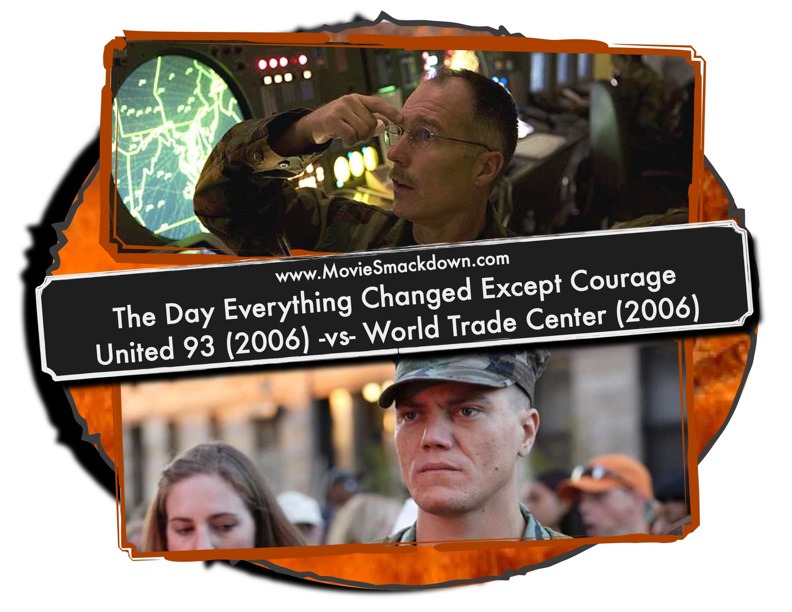
 The Smackdown
The Smackdown
It’s been years, but if you close your eyes, all those horrific images are still with you. Both of these 9/11 films were released in 2006 during the run-up to the five-year anniversary of the events of that terrible day. At the time critics kept wringing their hands about whether or not it was too early to tell these stories. Looking back, the better question could easily have been what took so long? Making films is how we increasingly begin to process events like these. It doesn’t have to trivialize them or make them less important, although that can be the danger.
We’ll use box office stats to name our opponents. With that as the standard, World Trade Center becomes our champ with 163-million dollars worldwide. United 93 comes in as the challenger with only 76-million dollars. But, especially when it comes to material like this, the box office is only a point of reference and nothing more. Let’s say that you have the heart to re-live 9/11 on film with just one of them as we approach the 10th anniversary with Osama Bin Laden finally having paid with his own life. Which film should you watch?
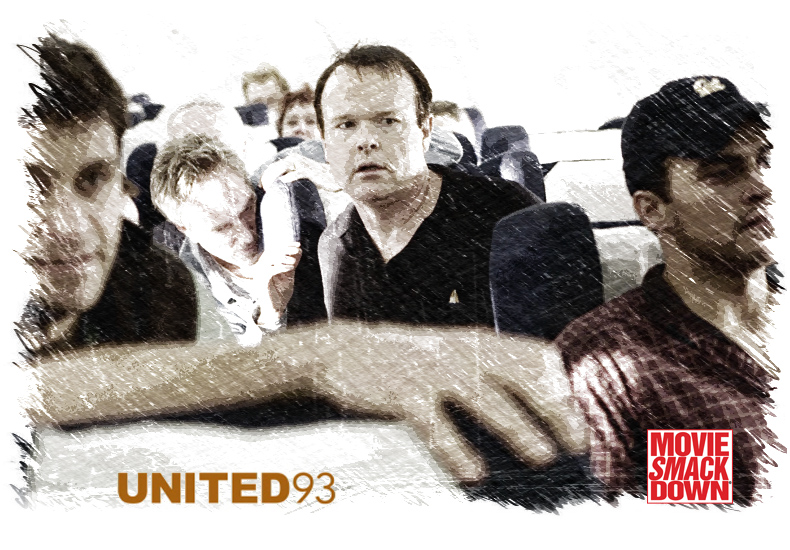
United 93
The power of United 93 is simply undeniable. We’ve all been on airplanes. It could happen to anyone. Today we all know the risks of terrorism. But the passengers on this flight never saw this coming and had mere minutes to decide to be heroes on that fateful morning when their flight left Newark for San Francisco with 33 passengers and seven crew members on board. Writer/director Paul Greengrass tells this like a documentary and it is simply riveting. The camera work here is dynamic — handheld, jutting into the chaos. The actors are unknown here and, rather than being a drawback, it makes the entire tableau that much more compelling. For most of the film’s 111 minutes, the intensity simply cannot be denied.
United 93 feels like a sacred film; like something that should be shown on TV every September 11th, like It’s A Wonderful Life at Christmas-time. People need to remember what happened that day, stripped of all the political name-calling, second-guessing and hidden agendas. And, yes, even bullshit-crackpot theories about how the U-S government attacked itself.
What happened on 9/11 was a sneak attack that easily surpassed Pearl Harbor because it was an act of war on civilians by extremists and not governments. Thousands of innocent Americans died. If you have forgotten how you felt that day, then go see this film. You will remember. You should remember. We all should.
It’s a mistake to think about this film “in context” by talking about Abu Ghraib or Guantanamo or the war in Iraq. These were things that were set in motion by reactions (and over-reactions) to the events of September 11. That day was so tragic and awful that it deserves, for at least a few hours, to be understood by itself and not by what it spawned. In the same way that United 93 works because there is no back-story to the characters on the plane (we only know what they know and know them only by what we see them say and do on the plane), the film should be watched as a powerful story about the singular dark power of 9/11 which many of us, in the heat of politics, have forgotten.
World Trade Center
Filled with actors you’ve seen before, World Trade Center focuses on the horrific experiences of two real-life New York Port Authority cops, John McLoughlin (Nicholas Cage) and Will Jimeno (Michael Pena), part of an instant-response unit, who were actually in the concourse of the World Trade Center when the Twin Towers crashed down around them on 9/11. The film takes two perspectives — that of McLoughlin and Jimeno after they were trapped in the rubble of the collapsed towers, but also the home-front where their families suffered through their own private hell. Both the cops and the families had nothing to do but wait for a rescue that, considering the totality of the destruction, seemed impossible. Only twenty people came out of that rubble in real life.
It’s hard to believe that this is an Oliver Stone directed film. There’s no crazy conspiracy theory at its core and he’s even included moments that are almost patriotically embarrassing. It’s as if Stone decided that this story is best told without the hyper-emotionalism and manipulation of his earlier work. He’s chosen to tell it, however, in a rather straight-forward way. Using a tight, well-drawn script from Andrea Berloff, Stone has concentrated on the characters and their problems and left his own baggage somewhere else.
For another compelling 9/11 related post, please read Hollywood in Wartime: Remembering the 2001 Emmy Awards by former TV Academy chairman and Smackdown editor-in-chief Bryce Zabel. He was elected immediately before 9/11 and forced to postpone the Emmy awards an unprecedented two times in the same year.
The Scorecard
They’re both powerful, meticulously constructed films that will make you feel the rage you felt on 9/11, the sadness at the losses, and the pride in Americans helping Americans. Both of them also bounce back and forth from two POVs — the rubble and home in World Trade Center and the plane and air traffic control mostly in United 93.
The most gripping moments of World Trade Center, for me, come in the beginning with the reconstruction of the response to the attack — starting with disbelief, moving to horror, the mad dash, trying to get it together enough to save lives. Naturally, it becomes a different film after the men are trapped. The power of United 93 is that it stays in that moment of scramble and terror for its entire running time.
World Trade Center feels more like a movie than United 93 — it’s got star casting all the way through it, starting with Nicholas Cage and working down, and so you are never completely transported because it does feel like a Big Hollywood Picture. United 93 has almost nobody in it that you’d recognize and that, combined with its directorial spareness, makes it a complete immersion into the feelings of 9/11. Because we haven’t seen the United 93 actors, our preconceived notions are limited and that feels right.
Another difference is that Stone’s film is defined by seeing what’s going on with the families of the trapped police officers, but Greengrass’s film stays in the action, never going for the familial emotion, almost like that would be too easy.
The readers at the Internet Movie Data Base (IMDB) gave United 93 7.9/10 and World Trade Center a 6.4/10 score.
The Decision
I was very moved by World Trade Center in all the ways that Stone intended. He’s made a strong, but conventional, film. But United 93 took me back so realistically I almost couldn’t stand it. While World Trade Center gives you the claustrophobia of being trapped and the awful feelings of the family tragedy, United 93 gives you raw 9/11 intensity. If you only have the emotional capacity for one 9/11 film on approaching the 10th anniversary, make it United 93. If you can stand the pain, see them both. Whatever you do, never forget.


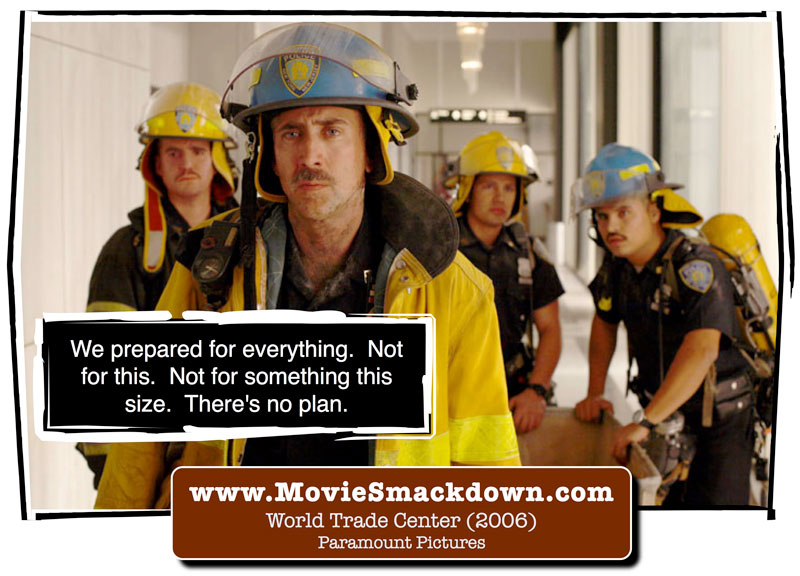
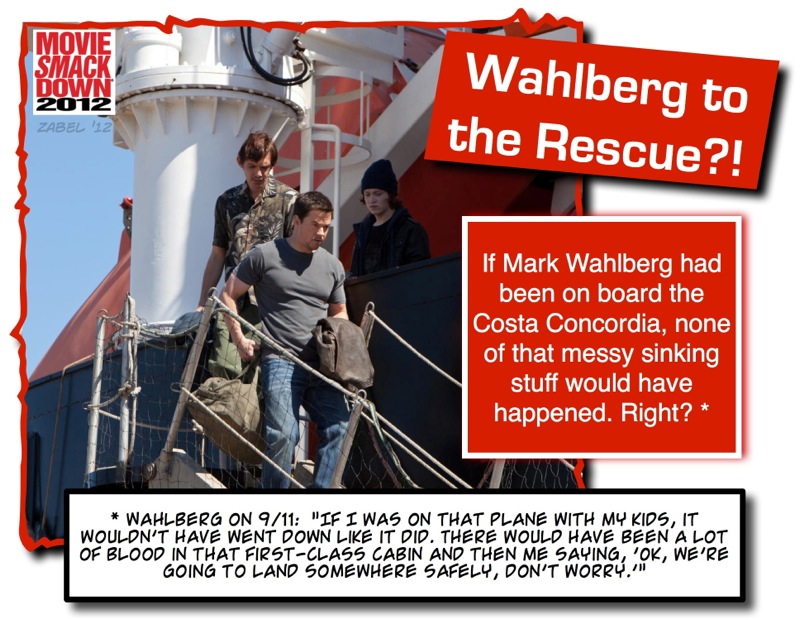
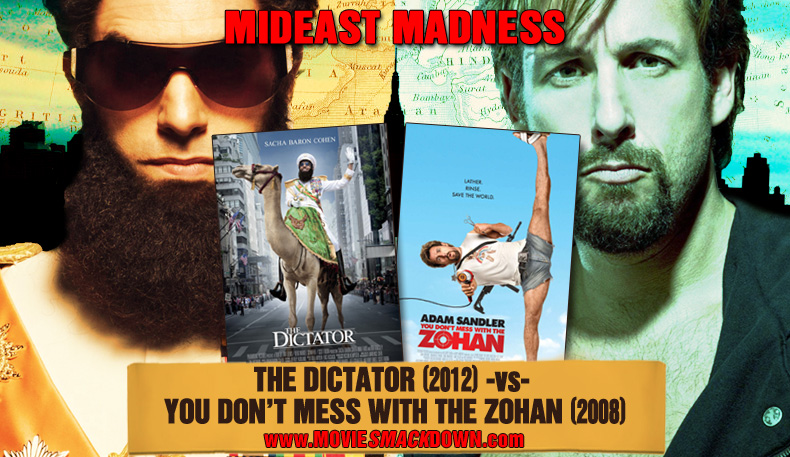
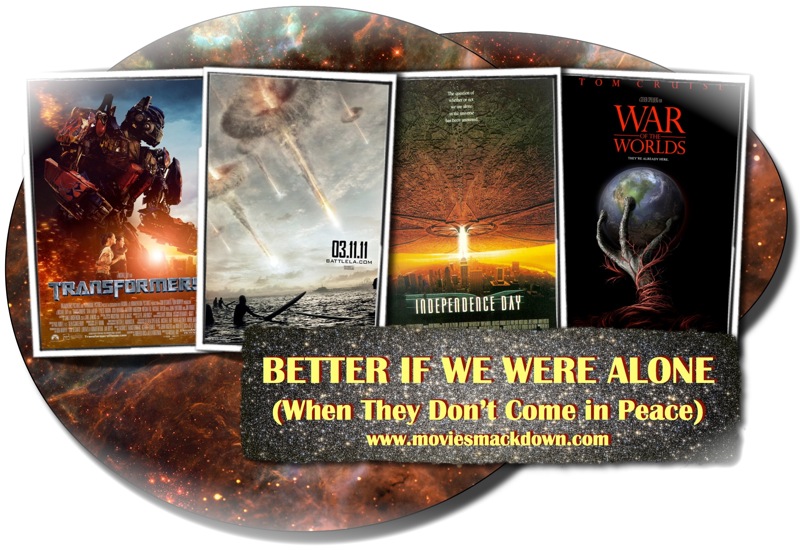
Bryce.. Nicely observed, well-put and I agree with your conclusion. Both films reinforce uncomfortable realities, viewed through the refocused prism of Sunday night’s events in Pakistan.
You tie the loose ends masterfully: “Whatever you do, never forget.”
At the risk of damaging a valuable friendship, and with the full realization that my reaction is totally opposite yours and everyone else’s who has commented on this Smackdown, I must say I totally disagree with the high praise being expressed for UNITED 93. My reaction can be found at http://www.needtovent.com. I will say, that if nothing else, the extreme difference of opinion does indicate that this film is something other than typical, mindless Hollywood fare.
Terrific review Bryce, and fitting for this time of year. The main issue I had with “World Trade Centre” was that the cast was filled with “name” faces, people who I immediately associated with other projects I’d seen. Which distracted, and detracted, from the impact of the film overall. I’m sorry, but Nicholas Cage just did nothing for me in “WTC”, and while I could see where Oliver Stone was going with it, the film lacked the raw emotional energy that came with “United 93”. I stand by a claim I made once that one day Paul Greengrass is going to get himself an Oscar, if he keeps making films like “United 93” and “Bloody Sunday”. He was nominated (and should have won) for “United 93”. Somehow, “United 93” manages to invoke that gaping horror we all felt that awful day, the stomach churning terror of not quite comprehending what was happening, while “World Trade Centre” feels more… well, manufactured. And in this case, manufactured is nowhere near as powerful as reaslitic docu-style filmmaking.
Still, two excellent films, each telling a different side of that day. And I agree with your result.
@ S Bell,
Although I didn’t really enjoy WTC, I think it’s OK for me that Stone approached the audience from two points of view. The first was from the people like Dave Karnes, who would naturally compelled for vengeance, given his military background. The other side was from civilian side of John McLoughlin, who didn’t really care about vengeance at the time the event took place. Especially for someone stuck beneath the rubble, striving to survive would be number one priority. I could not recall hearing him wanting to get even with whoever did the act of terrorism that day. Instead, he just tried to recall all the good things in life with his family. I think these two points of view still represent the way of the American people think about 9/11. Plus there possible some other people who embrace apathy on this matter. Still, I must agree with you that Stone jumped the gun by referring to Iraq instead of Afghanistan. As for this movie being a tool for propaganda, I don’t think so. I don’t think that it could really inspire patriotism because it got stuck dwelling with McLoughlin’s personal story, thus painting it as a drama.
What’s particularly odd about your “framing theory” about Stone’s approach to WORLD TRADE CENTER is that Oliver Stone is about the last guy I’d expect to frame anything in a way sympathetic to the Iraq War. Go figure.
I have to say that IMO, World Trade Center doesn’t hold a candle to United 93. I would also argue that Stone, while manipulating the effect of such a tragic event in recent history for personal gain, isn’t being totally straightforward with the way he’s telling the story, making conscious decisions to how he presents certain information. That, or the man is in serious need of a mass-communication lesson on framing theory. Let me explain why:
The major problem I have with WTC is Oliver Stone’s depiction of the film’s hero, Dave Karnes, the former marine who travels down to Ground Zero and ultimately finds the buried port authority officers. His screen time is used sparingly, but for scary, propagandistic means. The first time we see Karnes, he is watching the footage of the attack with coworkers in his office building. He proceeds to tell them that, while they know it or not, we are at war. He then proceeds to leave his office, go to church (where he receives his Divine instruction to take action, gets a buzzcut, and travels to Ground Zero. He then proceeds to do something of immense heroism, a feat that will make the real life man someone to be celebrated forever as he should be. However, Stone uses this heroism for underhanded mass-encoding. At the film’s conclusion, Karnes receives a phone call from his boss. He reports that he won’t be coming back to work just yet and that he’s not sure when he will be back, because, as his character puts it, “Someone is going to have to avenge this.”
So, what is my problem with all this? Let’s take a look back. A character of unbelievable heroism and bravery is given very little dialogue, the majority of which, when not in the actual action of saving the men, consists of talking about vengeance and war. The other times we see him, we see a civilian receiving a message from God and transforming into a soldier. Now, sure, these are in fact things that the real life man did. But as a filmmaker Stone has a responsibility to pay attention to the things his characters do and say, especially when dealing with the depiction of an event that has transformed both our domestic life and foreign policy.
The fact that he paints this character as one consumed with ideas of vengeance and war troubles me. If you don’t agree, think about the last things we learn about Karnes in the film’s epilogue:
As Stone uses title cards to present the paths that each of the characters’ took in the wake of 9/11 he proceeds to explain that Karnes went back to the military, serving his country honorably in two tours in Iraq.
What is the problem that I have with this? Well, it deals with framing-theory, an idea in mass-communication study that suggests that the media often not only tells us what to think about, but HOW to think about a certain subject.
The final subject matter dealing with Karnes speaks of the Iraq war, a war often linked to 9/11 by the Bush administration, but one that history has shown to have no affiliation. My problem is that throughout the course of the film, Afghanistan is NEVER mentioned. Not once. And that is the war that actually had ties to 9/11, that was our vengeance. But once again masses are presented with information that could help build an illusory link between 9/11 and the Iraq War.
“But he served in Iraq, that’s fact!” you say. I understand that. But he couldve simply decided that the title card read “went on to serve two tours in the military, serving his country honorably,” or what-have-you. However, he CHOSE to include Iraq, while having never mentioned the war that was directly connected to the terrorist attacks.
Being a filmmaker myself, I understand that I have a responsibility to pay attention to how I depict certain information, how that information is presented to my audience. And so yes, those are the events as they happened. But they are simultaneously filtered through Stone’s point of view, and I therefore find that perspective to be either incredibly propagandistic or hugely irresponsible.
So that’s my problem with the film. Oh and also, Nicholas Cage was terrible, and Stone somehow made an event that captivated all our lives and something that still affects all of us into an incredibly weak and boring story.
United 93, with an ensemble cast of largely unknown actors, was something of true artistry and heart in its storytelling. The debate between which film is better really isn’t even a question.
Nuff Said.
It’s a clear cut decision without doubt for me that United 93 is the better movie. I think that WTC was about drama, specifically family drama. Sure, there are 9/11 elements tossed in like seasonings, but it’s drama first, historical later. As for United 93, I consider it as historical portrayal first, thriller second.